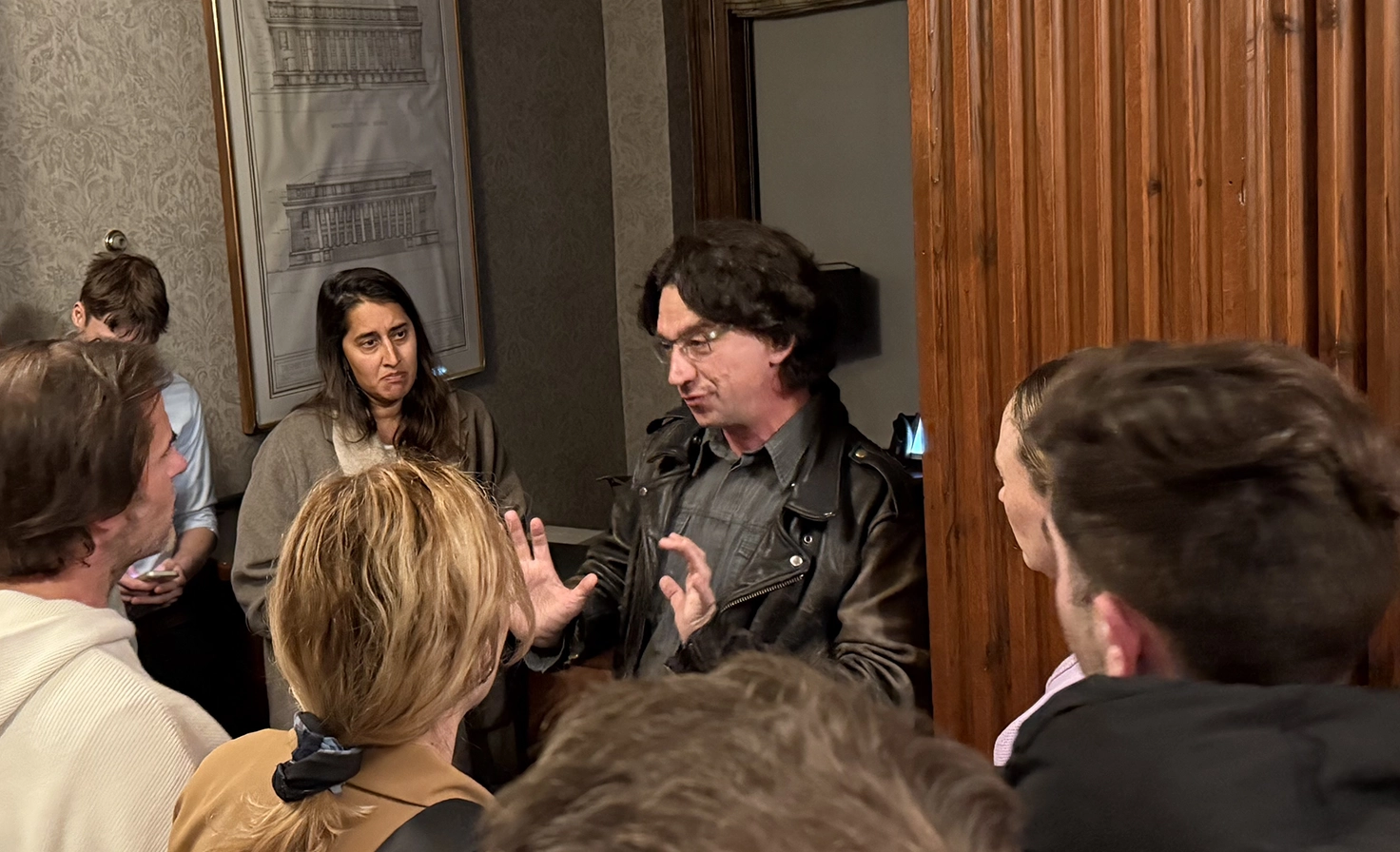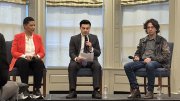On Monday, controversial far-right blogger Curtis Yarvin came to Cambridge to debate Harvard political scientist Danielle Allen. It was an unlikely pairing. Allen is a scholar of and advocate for democracy. Yarvin wants to replace the U.S. government with a monarchy. Allen is one of Harvard’s 25 “University professors,” the institution’s highest faculty honor. Yarvin publishes a Substack with 60,000 subscribers.
Nonetheless, the pair took the stage together in front of 110 students, alumni, and locals. The event, held at the Harvard Faculty Club, was not organized or sanctioned by the University. Instead, it was coordinated by Yarvin’s publisher, Passage Press, with support from Harvard’s John Adams Society, an undergraduate conservative group. (Passage, which bills itself as “an alternative to the increasingly closed-minded worldview of modern mainstream publishing,” publishes out-of-print titles by historical fascists and reactionaries as well as contemporary far-right thinkers such as Steve Sailer, a proponent of modern-day race science.)
Allen says she would not invite Yarvin to “any academic forum for which I was responsible.” In an email to Harvard Magazine, she wrote, “His work is not of a caliber that passes an academic bar. It is too full of historical error and sophistical argument.” (She notes that there are plenty of other conservative intellectuals “who work to a far higher standard and whom I would be glad to invite.”) But she was willing to appear alongside Yarvin at this outside event when asked by her students.
Yarvin’s ideas, though fringe and attention-seeking, have found an intellectual home in the “New Right” movement—and in the White House. Vice President Vance has referenced Yarvin while discussing the need to purge the government bureaucracy. State Department official Michael Anton has talked to Yarvin about empowering an “American Caesar.” And Trump donor Peter Thiel, who co-founded PayPal and Palantir Technologies, has called Yarvin a “powerful” historian. Allen is “surprised by the degree of influence Mr. Yarvin has had, even among Harvard College students,” noting that a Harvard undergraduate was one of DOGE’s first employees. Allen continued, “I think people do need to understand Yarvin’s argument, both what people experience as its attractions, and its errors, which are profound.”
Despite taking place “on” Harvard’s campus, the event felt like Yarvin’s home turf. Some attendees held copies of Yarvin’s book, which was sold at the event. Before the event, Allen conferred with a handful of students and advisors on the side of the room; Yarvin held court after, surrounded by two dozen curious interlocutors. Allen remained relatively stoic; Yarvin prodded the audience for laughs and playfully toyed with his hair. There were far more men than women, and Allen was one of few people of color.

The conversation, moderated by John Adams Society alum David Vega ’24, focused on two questions, which Allen told Harvard Magazine were crafted by Yarvin’s camp and changed from the initially agreed upon topics just a few hours before the event. The first was “Resolved: The long-term stability and flourishing of our society is better secured by concentrated executive authority than by democratic institutions.” Both speakers agreed there are deep problems with American democracy. But each envisioned the road to repair very differently.
Allen described democracy as “a matter of family inheritance,” noting that she is descended from activists who promoted female and African American rights. “They believed that empowerment is the bedrock for human thriving and well-being,” she said. While Allen and her siblings thrived, some of her cousins suffered from gun violence, substance abuse, and incarceration. Around 2009, she began to worry that American democracy was not living up to its promise. So, she started pursuing reform, initially in criminal justice and now in the political party system. (A former candidate for Massachusetts governor, she wants to end the party-based primary system, which she says shrinks the population base and empowers political parties instead of the general public.)
Allen thinks that the only system of government capable of protecting individual freedom is democracy. Yarvin, she said, believes that in order “to have a society that’s going to deliver for people,” you must have “absolute monarchs who operate in the context of belief in racial hierarchy.” But she refuted the history that undergirded Yarvin’s theories. “It is not the case that autocracies, over the course of history, have delivered good for human beings. They have consistently violated freedom.”
In his rebuttal, Yarvin described his childhood as one “inside what’s called the deep state.” His father, mother, and stepfather all worked in or around the government. He said, “When I observed the underbelly of this system from inside, it did not seem to have very much to do with the kind of abstractions that Professor Allen talks about.” He rebuffed Allen’s 2023 book, Justice by Means of Democracy, as “a work of Islamic history that was written by a Muslim….This is someone who believes entirely in the system that she’s describing.” Yarvin often dismissed Allen’s arguments as “abstractions.”
Yarvin said that Allen’s definition of democracy encompasses a series of intangible traits and values that go far beyond the mere holding of elections. He added that the American government does not resemble democracy, noting that incumbent members of the House of Representatives win reelection 98 percent of the time. He described that body as “a buffer against democracy.”
Allen agreed that Congressional incumbency is a significant problem, but disagreed that abandoning democracy was a proper response. “Mr. Yarvin here is really asking questions about engineering. And, yes, we have a heck of a lot of engineering improvements to bring to our democracy,” Allen said. The divergence between the two speakers, she said, is whether the answer is “regime change to unaccountable CEO monarchs—Trump and Musk—or renovating our democracy.”
As the conversation developed, Yarvin shared extended tangential anecdotes and name-dropped philosophers and historians. He twice discussed chimpanzees and early humans, first as evidence of the inherent human desire to dominate others and then as a rebuttal to innate human equality. Allen rarely engaged with Yarvin’s specific stories, but did question his reading of Aristotle.
In the second half of the evening, the speakers debated “Resolved: Harvard’s model of elite formation, grounded in a contested balance between merit and equality, undermines the democratic legitimacy of the political and cultural systems its graduates go on to shape.” Yarvin has written and spoken about the need to destroy Harvard; Allen recognizes that Harvard has flaws but considers the institution as central to American democracy and worthy of reform.
Yarvin argued that the process of knowledge-gathering has strayed from the pursuit of truth. Rather than a “Darwinian” survival-of-the-fittest marketplace of ideas, science is dominated by a “culture of grantsmanship,” he said, where researchers pursue whatever studies will lead to continued lab funding. He specifically criticized the field of virology, which he claimed had created and then covered up the COVID-19 virus. He argued that in response to the 1896 election of William McKinley, professors put themselves in charge of government functions and pursued “unaccountable public policy” that did not serve the country well.
Allen denied that professors run the country, “because obviously,” she joked. She challenged Yarvin’s notion that pluralism and “veritas” cannot coexist. “In general,” she said, “professors are not in charge, but expertise and ordinary knowledge…can work well together when we build the right structures for pulling them together.”
To close, Yarvin said he wants to see Harvard “renew” itself, and the field of science no longer be “filtered for power or for empire-building rather than for veritas.” In her final statement, Allen refuted Yarvin’s historical analysis, this time in reference to comments about Hitler and Stalin. She said that “absolute monarchy is not a path to the protection of freedom.” Frustration with the current system, she argued, does not justify tearing it down. “We need renovation in our universities. We need renovation in our democracy. But in both cases, we should absolutely preserve the anchors for human freedom.”
For an hour and a half after the debate’s conclusion, attendees lingered and mingled with each other and Yarvin. Although some people, including a writer for The Guardian, feared that such a debate would aid the “mainstreaming of Yarvin’s ideas,” the students in attendance felt that Yarvin’s ideas are already prominent. In agreeing to talk, said Aidan Fitzsimons ’25, Allen showcased “her commitment to genuine diversity of opinion and liberal discourse.”
Bringing Yarvin to campus provided a chance to engage with a type of conservatism that is popular in the United States and in its government but is generally not present on campus. “There is a reason that his kind of ideas are not popular on campus, or not written up by or originated among Harvard professors,” said moderator David Vega ’24. “He very much stands opposed to this institution.”
Some students were disappointed that the speakers did not refute each other’s ideas more directly and said that the event felt more like parallel talks than a debate. A graduate student whose desire to pursue government work made him hesitant to publicize his interest in an anti-democracy dissonant described Yarvin as “the most sincere intellectualization of what’s currently happening in government” and was hoping that Allen would “tear his premises to shreds.” He continued, “Tell me that my belief in individual rights is actually a good thing that produces good results. I did not get that, unfortunately.”
Similarly, Yarvin’s approach of criticizing democracy rather than extolling authoritarianism left some students unfulfilled. Fitzsimons, who is enrolled in Allen’s seminar “Justice by Means of Democracy,” was hoping to hear “that maybe authoritarianism has some virtues,” he said. “I didn’t learn any virtues about authoritarianism. All I heard was critiques about COVID and Harvard, which Danielle agreed with and anyone can make. That felt cowardly to me. It felt like he wasn’t dealing with the core premise, whereas she did.”
Throughout the past few years, Harvard has institutionally focused on “intellectual vitality,” with the stated aim of creating an environment where a wide range of beliefs can be examined. In some sense, Monday’s debate was an example of that principle, placing two very different ideas against each other. But at the same time, the event was secretive, hosted in a small space, and guarded by a dozen campus police officers. What does the future of discourse look like at Harvard?









